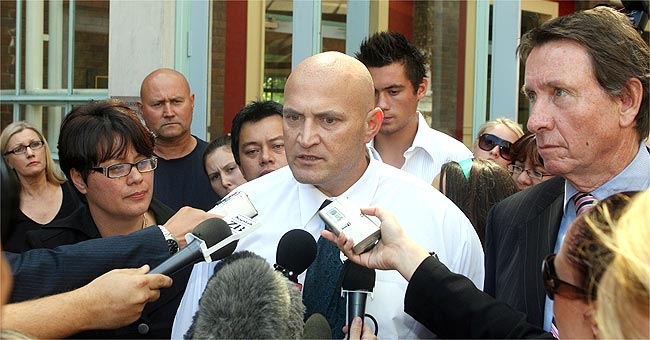|
Allegations of abuse
by NZ Police |
|
|
peterellis
Home / police allegations / Rickards,
Shipton, Schollum vs Jane Doe Page 4 - Initial Reaction to
Not Guilty Verdict |
|
|
END OF 'NIGHTMARE': Suspended
Assistant Police Commissioner Clint Rickards outside the High Court in Rape Crisis is calling for a change in the court system when it comes
to rape cases, after the not guilty verdicts in the police indecent assault
trial in
There had to be a change from the
adversarial system that pitted one person against another in terms of their
credibility, she said. Dr McGregor would like to see an
inquisitorial form where both parties must answer questions in court, he said
on NewstalkZB. In one of the country's highest
profile sex cases, Auckland Assistant Commissioner Clint Rickards, 46, and
former police colleagues Brad Shipton, 48, and Bob Schollum, 54, were
yesterday cleared of charges of kidnapping and indecently assaulting a
16-year-old girl in Rotorua between November 1983 and August 1984. After the verdicts it was revealed
that Shipton and Schollum are currently in jail for raping a 20-year-old
woman in Mt Manganui in 1989. The jury in the latest trial could
not be told this to ensure a fair trial, sparking public debate over whether
previous convictions should be admitted in court. Mr Rickards' lawyer John Haigh
said the jury would have been aware of the convictions of two of the
defendants but had withstood media pressure in reaching their verdict. "No one in their right mind
could believe that the jury didn't know about Shipton and Schollum's previous
conviction. "And yet again they (the
jury) focused on the evidence. "And that's why these people
attacking the verdict had no idea about the extent of the evidence that was
heard, how the complainant stacked up under examination." Mr Haigh said there were
situations where previous convictions were admitted in court. If the accused attacked the
character of the complainant and gave evidence then those previous
convictions could be admitted. He said people had forgotten that
the Louise Nicholas jury and the present jury had great fortitude to put
aside all the external influences, all the pressure, which had existed from
the media over the three years. "And whilst I don't suggest
the first jury was aware of previous convictions there was a great deal of
pressure on them and they excluded all that in this trial." High profile "In the great majority of
cases the fact that somebody has been convicted or acquitted on an earlier
occasion is completely irrelevant," he said. "It happens more often that
you'd think, but (other cases) just don't get the publicity. "Each case must be judged on
its own merits according to the interests of justice, but particularly the
interests of justice so far as the accused are concerned. "There's nothing about this
that suggests the rules need to be reviewed." Nor were similarities between the
three cases involving Shipton and Schollum so compelling that a jury needed
to know of the parallels, Mr Toogood said "If they were so similar that
the similarities amounted to compelling and cogent evidence of guilt, then
the court could have admitted them. "There's a strict test for
admitting that sort of evidence. "You can be sure that if the
Crown thought there was a strong enough connection between the three cases to
justify running an argument that the similarities went to prove an element of
the charges, they would have run it. "They could have asked to be
able to do it, if they had thought `there is a case here'." Meanwhile, a leading criminologist
has rejected Clint Rickards' comments that his former colleagues and
co-defendants Brad Shipton and Bob Schollum should not have been imprisoned
for rape. The pair were convicted in 2005 of
raping a 20-year-old woman in Mt Maunganui in 1989 and sentenced to 8½ years
and eight years respectively. Two others were also convicted for their
involvement. Speaking outside court yesterday
after his acquittal on the latest charges, Mr Rickards described the police
investigation into the cases as a shambles and said questions needed to be
asked. Schollum and Shipton should not be
in prison, he said. The comments were devastating for
the victim involved, said The jury had heard the evidence in
that case, weighed it up and convicted the four men, one of whom had since
gone on to admit involvement in abducting the woman, she said. "Surely. . . in that
situation the jury also made a right decision based on the evidence and that
cannot be ignored," she told Radio New Dr "I don't think a lot of the
behaviour displayed by Mr Rickards has been appropriate." Turning up to court in his police
uniform on the first day of the Louise Nicholas trial showed Mr Rickards'
"blatant disregard for police rules and regulations and illustrated yet
again his arrogance and his desire to be intimidating". Andrea Black, from Rape Crisis,
said today she had no doubt the trial, or the earlier one involving Louise
Nicholas, would have turned out differently if the details of Shipton's and
Schollum's convictions had not been suppressed. "It's a huge issue," she
told Newstalk ZB. "Why should it be that they
are protected rather than the survivor or the person who has been harmed
being given some protection? It's the only process we have in "It's not a justice system,
it's a legal system." |

